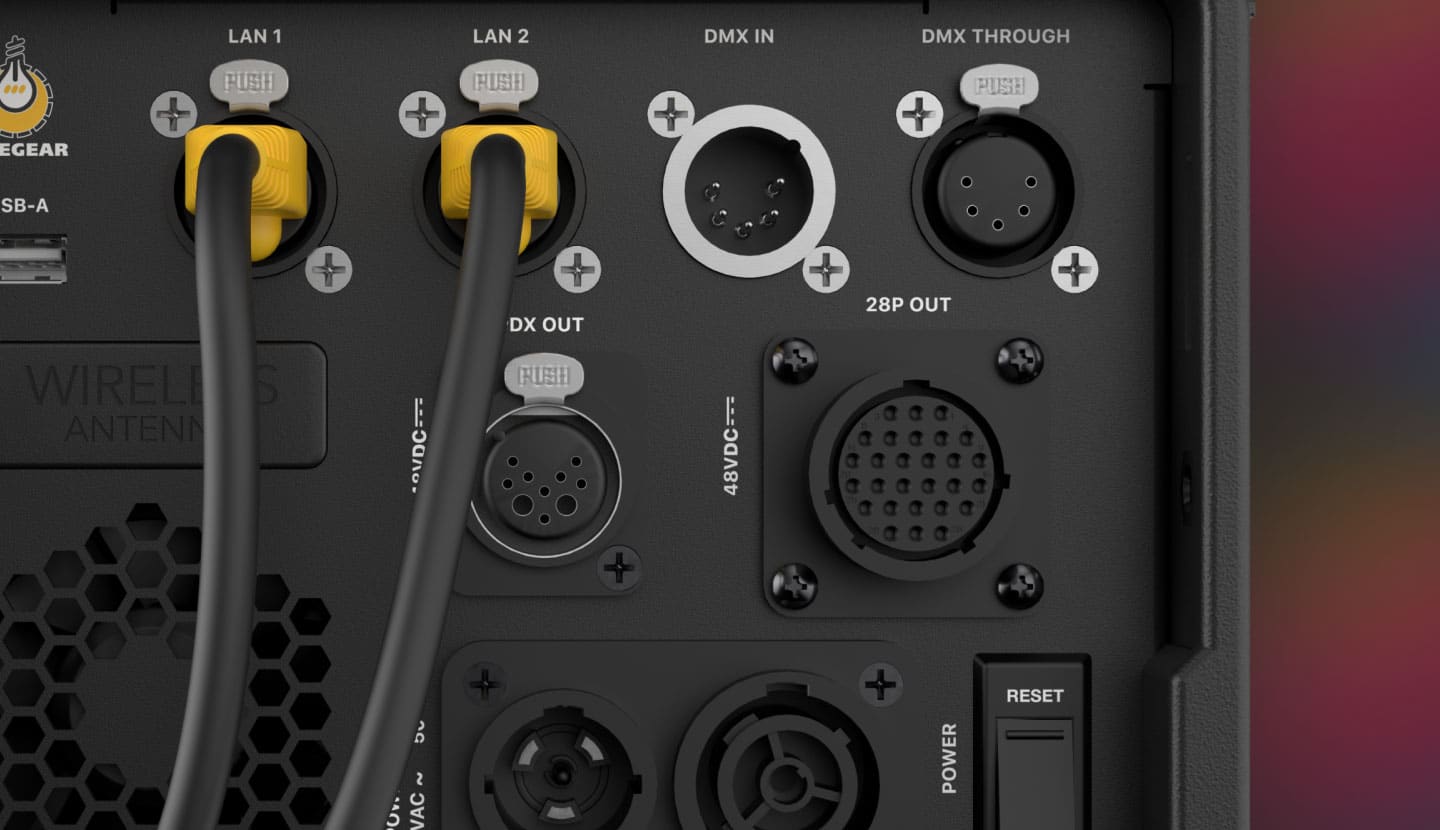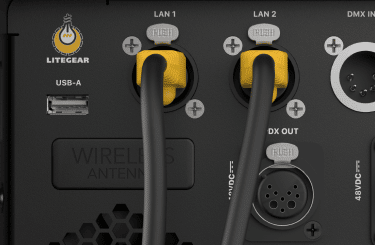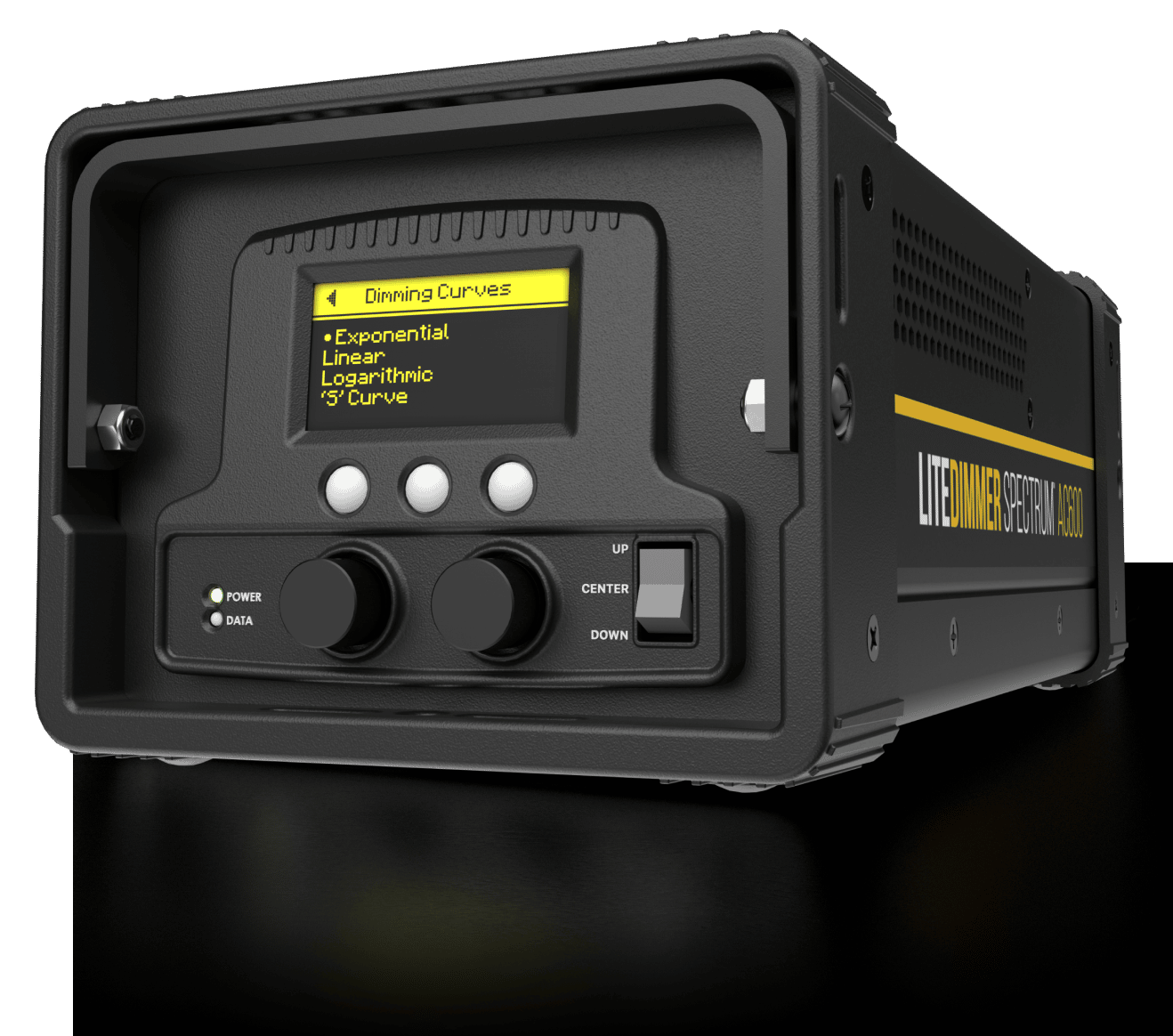
Built on the rock-solid Spectrum OS foundation OS2.8 is a feature-packed update designed for the LiteDimmer Spectrum AC600. With the introduction of Streaming ACN (sACN) and Art-Net protocols, Spectrum OS2.8 offers the most advanced communication protocols available.
The integrated network switch enables daisy-chaining using etherCON or ethernet cables with a choice of four dimming curves giving you complete control of your fixture’s intensity. Spectrum OS2.8 adapts to your way of working and like all LiteGear products, Spectrum OS is backed by our best-in-class customer support. Spectrum OS2.8 applies only to the LiteDimmer Spectrum AC600.

With Spectrum OS2.8, Streaming ACN (E1.31) is fully implemented in the LiteDimmer Spectrum AC600. This standard ethernet-based protocol efficiently transports DMX universes over the network and eliminates the need for a DMX gateway. Known for its ease of use, sACN makes it fast and simple to set up and connect many devices, like the AC600, to a lighting network. The dimmer can be set to search for sACN, Art-Net, or both signals on the connected network. sACN is supported by most professional lighting consoles or lighting control programs and seamlessly works with the AC600 dimmer.
Spectrum OS2.8 offers you the option to choose your preferred ethernet-based protocol. Art-Net 4, like sACN, efficiently transports DMX universes over the network and eliminates the need for a DMX gateway. An added benefit of Art-Net is its ability to allow 2-way communication between devices using both DMX and RDM lighting data. It is straightforward to setup the AC600 with menu parameters for selecting the Art-Net Net, Sub-Net, and Universe. Using RDM over Art-Net is an amazing way to control every setting of the AC600 dimmer remotely. Art-Net™ is a trademark of Artistic License Engineering Ltd.
With Spectrum OS2.8, the Art-Net and sACN gateway takes full advantage of the integrated network switch and the 5-Pin DMX hardware on the AC600. The gateway translates Art-Net or sACN lighting data into DMX512 and outputs the signal through the 5-Pin DMX XLR ports. This enables bringing ethernet based communication into the AC600 and daisy-chaining out with normal 5-Pin DMX, reducing the amount of networking equipment in the rig. This feature means fewer cables and allows you to create practically any network layout you desire.


Spectrum OS2.8 unlocks the integrated network switch included in the LiteDimmer Spectrum AC600. Reliably connect your sACN or Art-Net devices on your local area network without the need for additional network devices. The ability to daisy-chain through the ethernet ports allows for quick and reliable connectivity for up to 32 network devices. In addition, Spectrum OS2.8 has a full menu of TCP/IP parameters so you can quickly set the IP Address, subnet mask, and other such network settings.

Spectrum OS2.8 gives you greater control of your dimmer by offering the ability to choose between four dimming curves: Exponential, Linear, Logarithmic, and S-Curve. Exponential is the most common and allows for greater low-end dimming control. Linear dimming directly translates the dim level to light intensity. Logarithmic allows for greater high-end dimming control. And finally, S-Curve dimming gives you greater control over both the low and high-end dimming ranges.
As with every Spectrum OS update, OS2.8 has many improvements and enhancements to make the experience with LiteGear dimmers better. OS2.8 includes new RDM control parameters, DMX improvements, behind-the-scenes color compensation, menu tree enhancements, and minor bug fixes. We recommend you update to the latest version of Spectrum OS to get the most of your LiteGear dimmer.

Spectrum OS includes 23 new DMX personalities which give massive amounts of control for console programmers. Among others, the RGB DMX personalities enables mixing of your own color via the console by either simple RGB parameters or with the option to set your white point. These modes make Spectrum a powerful pixel mapping fixture with all the physical advantages of a LiteMat.
With an emphasis on local and hands-on operation, the Spectrum OS2’s Cue function places up to four “looks” at your fingertips. The Cue Playback function has the ability to record the entire output including intensity, CCT, tint, saturation, and accent color. Easily hold, bump and flash the output when the actor hits a mark or swap to a brighter look when the talent opens the door. The Cue Playback function brings powerful hands-on operation to the on-set lighting technician.
Parameter presets offers six pre-set values each for CCT, accent color, and saturation. Quickly select common color settings with the press of one button. Parameter presets streamlines the lighting workflow by eliminating scrolling through values. The user can also replace the factory parameter presets with custom selections.
A simple yet effective feature, Audition allows the operator to easily turn the fixture output off and on with the press of a single button. Audition brings the common task of “sampling” a light’s output into the hands of the user by turning the fixture off and on in order to gauge its effectiveness without having to change the current intensity or color.
The Nudge feature allows the user to combine the use of encoders and screen-side buttons which gives a higher level of control and speed when adjusting parameters such as CCT, accent color, saturation, and tint.
This feature is an intelligent power manager that looks out for you by allowing larger light fixtures to operate on ballasts with smaller power sources.
Operate the ballast in local mode while simultaneously outputting DMX signal to other Spectrum devices. Now one ballast can control many using DMX Transmit Mode.
Remote Device Management (RDM) allows nearly all settings of Spectrum OS2 to be accessed over DMX networks by compatible devices. Convenient for when the ballast is inaccessible.
When DMX signal is detected, the Spectrum ballast immediately switches to override its operation from local to remote control. With the switch down, OS2 shows live streaming data, often useful for troubleshooting.
Additional enhancements include Improved Color Science and Tint Feature, Streamlined Menu Navigation, Ballast Status Visibility, Enhanced Low-Light Color Consistency, and much more.